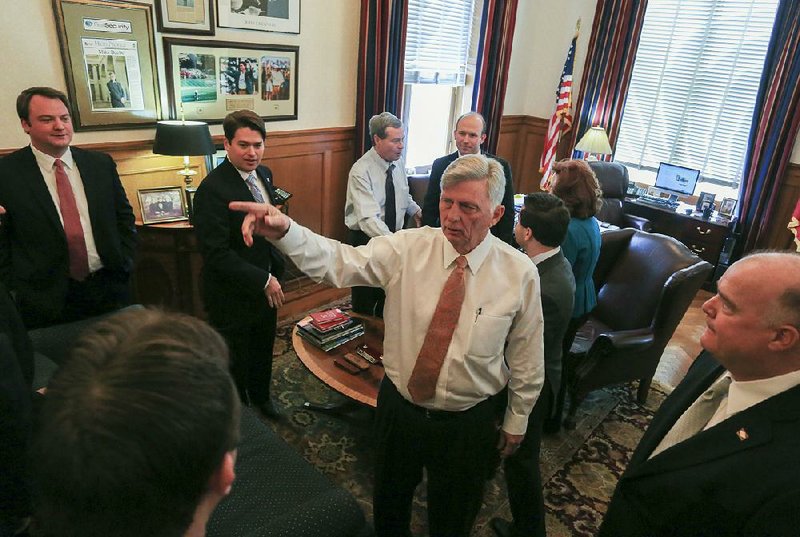State lawmakers filed a resolution Monday that would allow consideration of legislation keeping the lieutenant governor’s office vacant for the rest of the year.
Sens. Eddie Joe Williams, R-Cabot, and Keith Ingram, D-West Memphis, sponsored the Senate resolution. It takes a two-thirds vote of both the House and the Senate to introduce nonappropriation bills during the fiscal session, which began Monday.
The bill, which Williams hopes to introduce, would amend state law, striking the requirement that special elections be held within 150 days after an office becomes vacant. Governors would begiven “the discretion to determine whether special elections to fill certain vacancies are impractical because of the timing of the vacancy,” according to draft language contained in the resolution.
The draft legislation also says the lieutenant governor’s post could be left unfilled when it is vacated within 10 months of a general election in which voters would normally be voting to fill the post. Williams said there is overwhelming support for the bill in both chambers and pointed out that it would save the state about $1.5 million in costs for holding a special election.
Speaker of the House Davy Carter, R-Cabot, said Monday that, other than the bill on special elections, he did not plan to take up any nonfiscal legislation during the session. He said he expects the measure to easily pass the House.
“I’m not aware of anyone that’s opposed to that bill, so I think it will pass unanimously,” Carter said.
Several other resolutions addressing nonappropriation measures have been filed in recent days, but “I don’t think any of those things have the support to my knowledge” to be taken up and pass, he said.
Also Monday, House Majority Leader Bruce Westerman, R-Hot Springs, filed a resolution seeking permission for him to introduce legislation regarding the federal Patient Protectiona and Affordable Care Act.
The measure, co-sponsored by Sen. Bart Hester, R-Cave Springs, would allow businesses that are fined for not providing employee health insurance to receive a tax credit in the same amount on their state income taxes.
If the fines are more than the amount of taxes owed, thestate would pay employers the difference.
“Even though President [Barack] Obama has delayed that for this year, I wanted to provide some protection for small businesses in Arkansas for next year,” Westerman said. “In reality if the employer mandate does go into effect next January, by the time those fines are levied and the taxes are paid, it would be in the following budget before there would ever be a tax credit. I don’t think it would effect the state budget this year, but I think we need to have something in place to protect small businesses should the federal government levy that employer mandate.”
Westerman said the measure, House Resolution 1006, could cost the state between $30 million and $40 million per year based on estimates from the governor’s office.
“It’s a shame if that has to come out of the state budget to help deal with a federal rule,” he said.
The House Rules Committee voted to table the proposal Monday at Westerman’s request. Westerman said he wanted to wait to discuss the resolution until the Senate version was filed.
The committee also tabled a vote on a proposal that would stop the implementation of Common Core educational standard and freeze funding for the programs until Jan. 1, 2017.
The Arkansas Board of Education in July 2010 adopted the Common Core State Standards in mathematics and English/language arts, putting Arkansas among the 46 states and District of Columbia to adopt the same set of standards. The new standards replaced Arkansas’ own standards over three years’ time, starting in kindergarten-through-second grades in the 2011-12 school year and finishing this year in grades nine-through-12.
Other nonappropriation resolutions filed included a measure to regulate the transport and containment of feral hogs before they are killed, and a measure to require the Joint Committee on Constitutional Amendments to meet on the first Tuesday after the 31st day of each regular session of the General Assembly to establish a meeting calendar. Other lawmakers want permission to introduce bills that would allow certain school employees to be licensed as private security guards; a bill supporting the popular names that the secretary of state has assigned to three proposed constitutional amendments; and a bill to allow for personal income tax credits to offset personal health insurance premiums.
Front Section, Pages 1 on 02/11/2014
